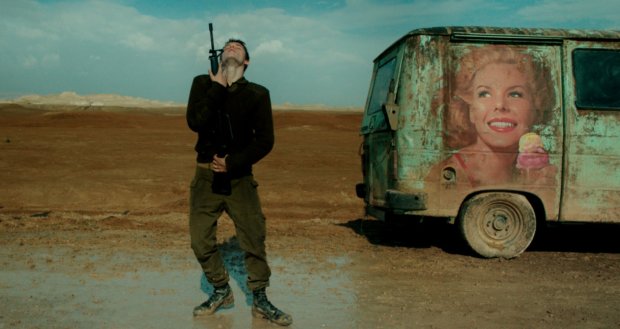You have no items in your cart. Want to get some nice things?
Go shopping
Israeli director Samuel Maoz’s films have a record of adhering to his guiding philosophy that “the basic necessary condition for improvement is to accept self-criticism”. His 2009 film Lebanon, which received the Golden Lion at Venice Film Festival and a twenty-minute standing ovation, explored the trauma of being a tank gunner during the Israeli–Lebanese conflict. Now, with his Silver Lion winning Foxtrot, Maoz casts an unflinching eye on the Israeli-Palestinian conflict.
Foxtrot speaks the language of a tragedy following a similar three-act structure, which each create very distinct worlds of emotion. First we enter the lives of Michael and Dafna Feldman, who receive a knock at the door by Israeli Defence soldiers delivering news that leaves the couple reeling – they are informed their son has fallen. The wealthy well-to-do apartment is transformed into a dark and dizzying world. Whilst Dafna (Sarah Adler) is swiftly drugged and taken off scene, the camera zooms in on the vortex-like piece of abstract art that hangs in their hallway. A simple corridor becomes maze-like, and Michael, played by the renowned and supremely talented Lior Ashkenazi, expresses his shock with quiet horror. Birdseye-view shots twist and turn above the characters mimicking their lack of control over the shock-driven state of affairs.
Michael, a proud and stoic man, releases his anger in insidious ways. In one prominent scene, Michael’s dog senses he is upset, walks over to him, ready to provide comfort with those big brown eyes and soft muzzle, to which Michael responds with a sharp kick in the gut. The dog runs away whimpering. Michael and his wife also self-harm in the process of grief. Washing his hands, Michael keeps the hot tap running while it rises in temperature, keeping his hand steady under the flow as it sears his skin in the process. Dafna similarly scrubs her fingers to the point that they are bleeding and raw – her hands shake as she places pomegranate seeds in the shape of 20 on a birthday cake for her fallen son; she begins to wash the mixing bowl and instinctively moves the wiry side of the sponge onto her fingers, scrubbing them hard until they bleed whilst the camera remains on them unflinching. And yet Maoz expertly offsets the tragedy with moments of comedy. Michael’s regular phone alarms reminding him to drink water are blind to moments of intense feeling and emotion which help create a brilliantly subtle dark comedy.
Surrealism and absurdity reign in the second part of the film. The location shifts to the middle of the desert, where their son Jonathon is stationed at a checkpoint with a small group of young male soldiers. The backdrop of the mountains look much like a matte painting to reinforce the symbolic nature of this section. The soldiers open up the checkpoint’s barrier to allow the surreal but nonchalant passage of a camel through their set… Sleeping at night in a sinking shipping container that could be taken from an apocalyptic film set as viscous fluids drip from the walls. During the day, the boys are left playing a waiting game for cars to pass through the arbitrary border. When they do, the IDs of passers-by are scanned by an other-worldly science fictionesque machine that passengers hope beeps CLEAR. Moving from surrealism to a defining moment of electrifying intensity, the mundanity of the soldiers’ lives is shattered by an event that leaves Jonathon traumatised.
Like many films of New Israeli Cinema, Maoz’s Foxtrot is here to probe and reflect on the complications and nuances of Israeli society. Far from a black-and-white criticism of the Israeli Defence Force, it is more interested in a commentary on the grievous effects war has on civilians, families, and on the young male soldiers. It says anyone can commit an atrocity in the microcosm of war. Triggers are pulled, disasters happen – it could be any one of us. However, Maoz’s self-criticism has earned him backlash from the Israeli state. Culture minister, Miri Regev tried to ban the film from being screened at the Festival of Israeli Cinema in Paris when she heard about how the film depicted a cover-up of Palestinian deaths by the Israeli Defence Forces.
Maoz speaks from experience, and it took him years to be able to make the very personal film Lebanon. Foxtrot is once again a kind of therapy, giving form to the trauma of being an executioner, whether that be of a father who is wracked with guilt after discovering his son has died whilst serving, or the soldier who fires at a person who may or may not be innocent. And beyond personal experience, Maoz opens up his films to collective trauma: “I realised that this was no longer about me and my needs, my problems, my memories, my pain. Our boys were dealing with the same thing all over again” – two steps forward and two steps back; so the dance of history goes.
About Olivia Neilson
Olivia has an MA in Film from King's College London. She works in Arts PR and is a freelance writer.




